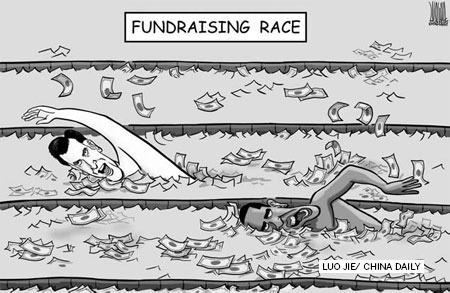

 The Occupy Wall Street protest last year was against money in politics. It is not difficult to figure why if you have been following the 2012 US presidential campaign.
The Occupy Wall Street protest last year was against money in politics. It is not difficult to figure why if you have been following the 2012 US presidential campaign.
US President Barack Obama has stepped up his campaign despite being head of a state haunted by a huge national debt, high jobless rate and serious droughts. He appeared in multiple campaign events in Connecticut on Monday, Washington DC on Tuesday and Colorado on Wednesday.
Last Monday, Obama caused a traffic snarl in New York City when he returned for a $40,000-a-head fundraiser after having raised $4.5 million at a star-studded event at actress Sarah Jessica Parker's house in Manhattan about seven weeks ago.
Obama is apparently trying to catch up with Republican presidential candidate Mitt Romney who has raised more funds than him three months in a row. In July, Romney raised $101 million against Obama's $75 million.
But between January and June, Obama outspent Romney $400 million to $131 million.
Last month, Obama attended 21 fundraisers, in addition to 17 campaign-themed public events. It seemed odd to see him promising to help poor and middle-class Americans at grassroots campaign events in the day and wining and dining with Wall Street financiers, Hollywood celebrities and rich liberal groups at fancy restaurants at night.
While some Republicans have dubbed Obama "Campaign-in-Chief", their candidate Romney's schedule is just as busy. He campaigned in Illinois on Tuesday and Iowa on Wednesday.
Obama's top contributors include Microsoft, University of California and Harvard University. The big donors for Romney are Goldman Sachs, JPMorgan Chase, Morgan Stanley and Bank of America, according to the Center for Responsive Politics.
Surely, both candidates believe the amount of money they raise will be crucial to winning the election. It has allowed them to spend an unprecedented amount of money running negative advertisements against each other in the past months, especially in the battleground states of Ohio and Florida.
In Cleveland, Ohio, for example, an average viewer is seeing 87 presidential campaign spots on TV a week, compared with 70 in Orlando, Florida.
By spreading mostly biased or untrue stories about their rivals in the negative ads, both candidates seem to firmly believe that a lie repeated often becomes the truth.
Of course, many nasty ads are paid for by the so-called Super PACs, usually big money from corporations and the rich. A Supreme Court ruling in the Citizens United case in 2010 entitled corporations to spend unlimited amounts of money in US elections, both at federal and local levels.
The increasing role played by money in politics has sparked an outcry among some Americans. They say democracy is now on sale to the highest bidder.
In an op-ed piece on Tuesday, former US Labor Secretary Robert Reich, a long-time critic of concentrated wealth and corrupt politics in the US, called on people to fight the buyers and sellers of American democracy.
Money has already changed the nature of democracy and free election, which the US claims to champion and intends to spread across the world.
But if democracy and free election are all about how much money you can raise and how nasty you can get in negative ads, as is evident in this presidential race, I am not sure what kind of exemplary power the US is.
What I am sure of is that in the run-up to the November election, the exemplary power of money in politics will only multiply.
The author, based in New York, is Deputy Editor of China Daily USA. E-mail: chenweihua@chinadaily.com.cn
(China Daily 08/11/2012 page5)